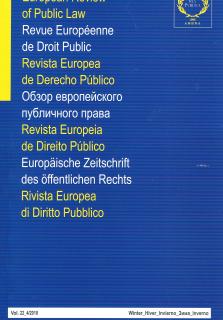
Jurisprudence
Court of Justice of the European Communities /
Cour de justice des Communautés européennes
2005-2009
These five years of transition, awaiting the new legal framework for the functioning of the European Union, gave to the European judicature the opportunity to clarify many issues related to the rules governing the adoption and the validity of the acts of the competent institutions and bodies and to confirm some major breakthroughs, including in the field of the EU competence on criminal matters within the different pillars. The close scrutiny of the EU acts is linked to the raising number of subject matters covered by them and the need to comply with the requirements of the law, both formal and on the substance. The EU citizens were concerned in many aspects of their life: as workers wishing to ensure their individual and collective rights, as consumers seeking protection, as students applying for a benefit scheme, as people acting in a complex economic environment and, of course, as persons asking to be informed on the decision-making process and seeking to see their rights fully taken into account. The Court’s contribution was essential in that respect, as the decisions of the Institutions and their implementation must be enacted and interpreted so as to achieve all these goals, and even more. The challenges for the future include the interpretation of the novelties introduced by the Lisbon Treaty and the strengthening of the rule of law, with the new role of the Court in matters where the EU acts were beyond its validity control.
Ces cinq années de transition, en attendant le nouveau cadre juridique pour le fonctionnement de l’Union européenne, ont donné aux juridictions communautaires la possibilité de clarifier certaines questions liées aux règles régissant l’adoption et la validité des actes des institutions et organes compétents et de confirmer quelques percées majeures, y compris dans le domaine des compétences de l’Union européenne en matière criminelle au sein des différents piliers. L’examen approfondi des actes de l’Union européenne est lié au nombre croissant de matières qu’ils couvrent et à la nécessité de se conformer aux exigences de la loi, formellement et en substance. Les citoyens européens étaient concernés dans de nombreux aspects de leur vie: comme travailleurs voulant garantir leurs droits individuels et collectifs, comme consommateurs cherchant une protection, comme étudiants demandant une prestation, comme individus vivant dans un environnement économique complexe, et naturellement comme personnes soucieuses d’être au courant du processus de prise de décision et de voir leurs droits intégralement pris en compte. La contribution de la Cour a été essentielle à cet égard, puisque les décisions des institutions et leur exécution doivent être adoptées et interprétées de manière à atteindre tous ces objectifs, et même plus. Les défis de l’avenir incluent l’interprétation des nouveautés introduites par le Traité de Lisbonne et la consolidation de l’Etat de droit, avec le nouveau rôle de la Cour dans les matières où les actes de l’Union européenne étaient au-delà de son contrôle de validité.





















